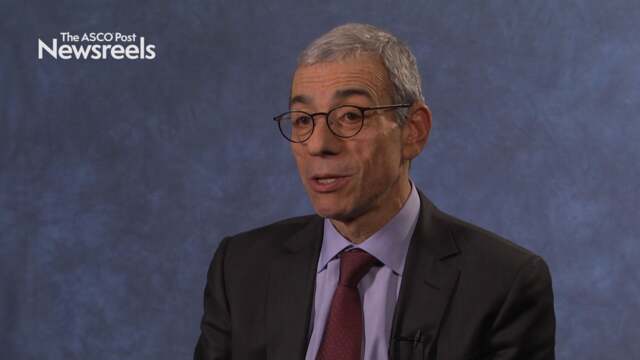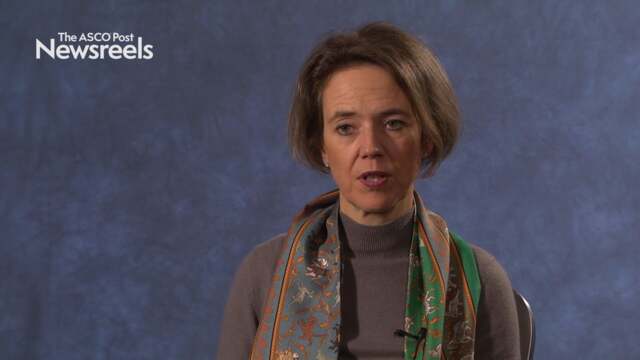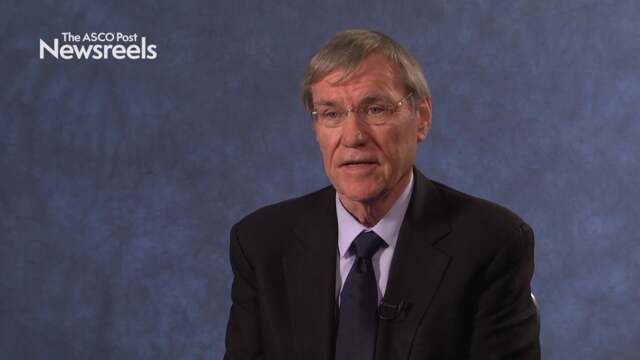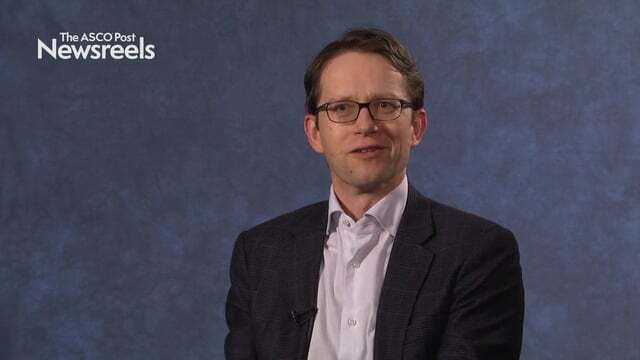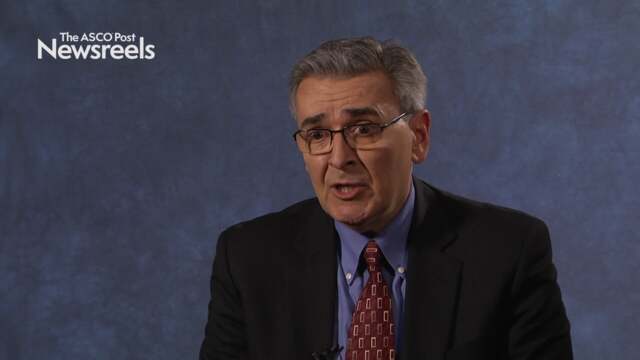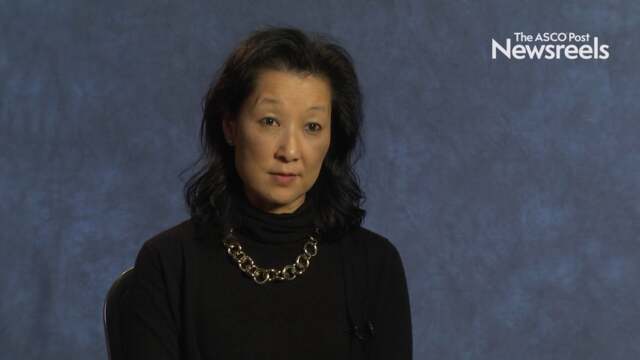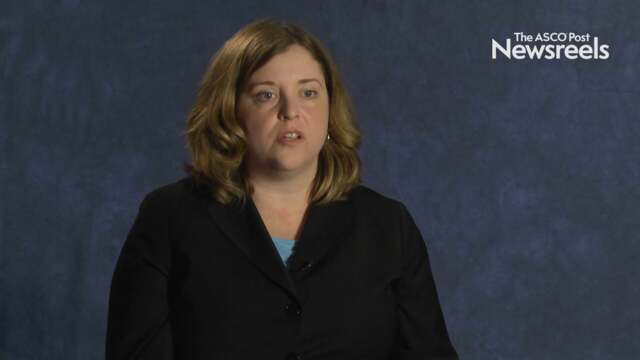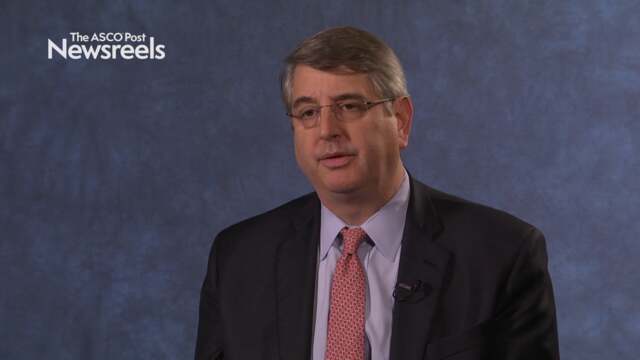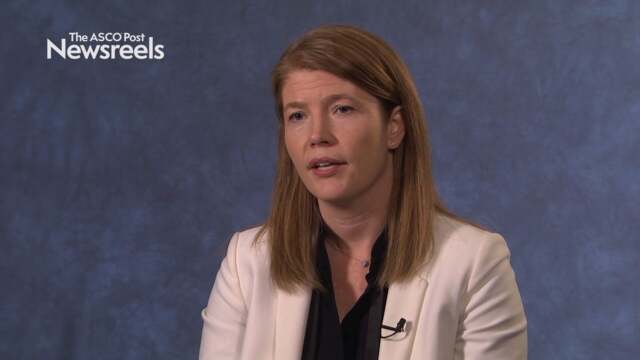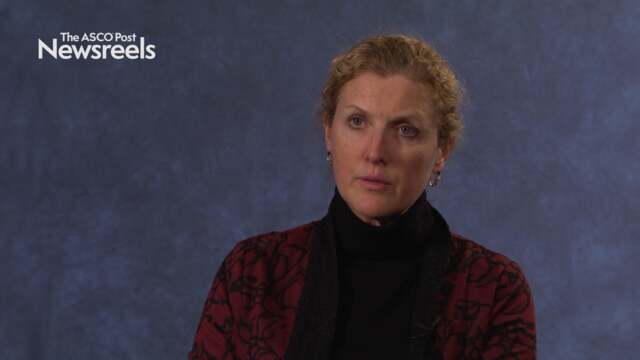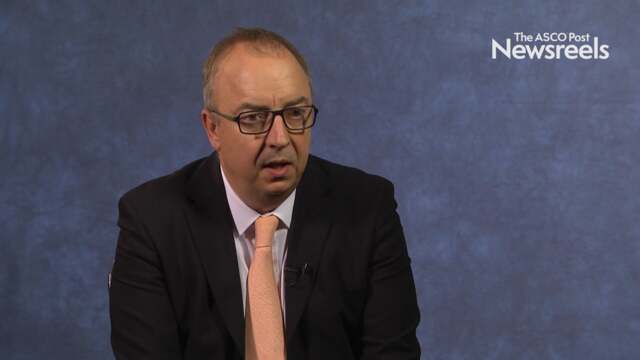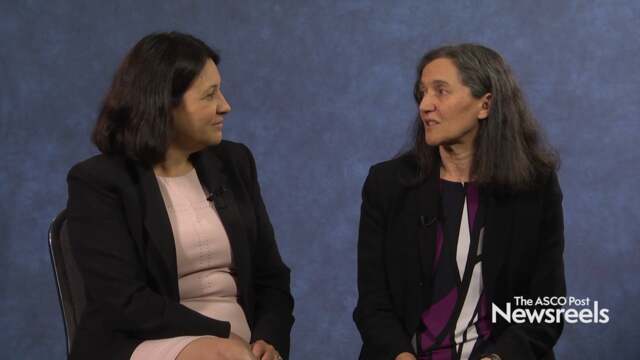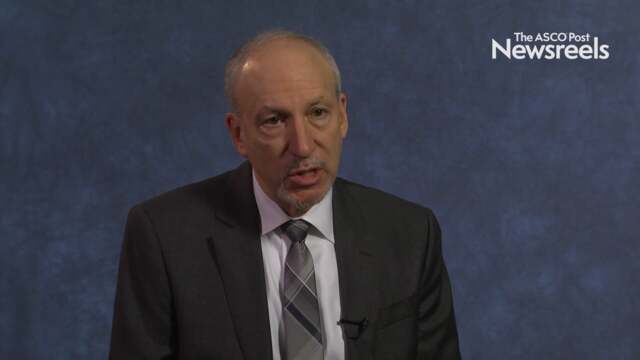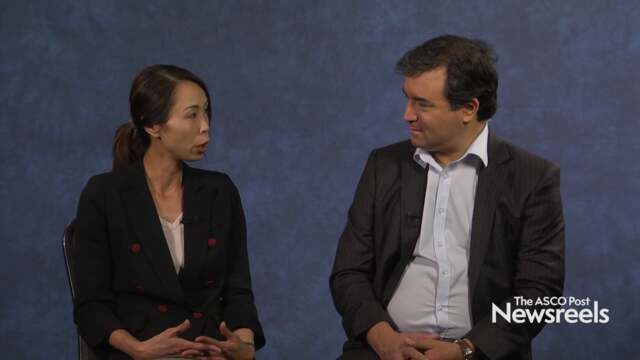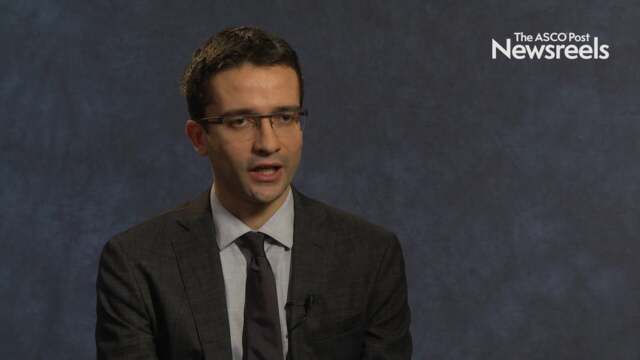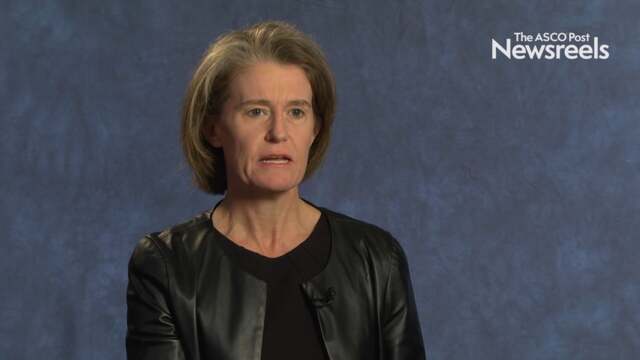2017 San Antonio Breast Cancer Symposium
Modest Weight Loss Reduces Breast Cancer Risk
Evidence of the numerous health benefits of weight loss continues to mount, and the hope is that doctors and patients are listening. A large observational study presented at the 2017 San Antonio Breas...
Talazoparib Reduces Risk of Disease Progression in BRCA-Mutated Breast Cancer
In patients with BRCA-positive advanced breast cancer, talazoparib reduced the risk of disease progression or death by 46% vs chemotherapy, according to the phase III EMBRACA trial presented at the 20...
EXPERT POINT OF VIEW: Aditya Bardia, MD
ADITYA BARDIA, MD, Director of Precision Medicine at the Center for Breast Cancer, Massachusetts General Hospital, Harvard Medical School, Boston, said: “This large, well-powered trial that included ...
No Evidence of Celecoxib Benefit Reported in Patients With Early Breast Cancer
TWO YEARS of treatment with celecoxib had no observed effect on 5-year outcomes of patients with early breast cancer in the large REACT trial presented at the 2017 San Antonio Breast Cancer Symposium....
Selected Abstracts From the San Antonio Breast Cancer Symposium
EACH YEAR, The ASCO Post asks Jame Abraham, MD, FACP, Director of the Breast Oncology Program at Taussig Cancer Institute and Co-Director of the Cleveland Clinic Comprehensive Breast Cancer Program, ...
Ovarian Function Suppression During and After Chemotherapy Valid for Some Patients With Early Breast Cancer
Temporary ovarian suppression during chemotherapy as a means of preserving ovarian function and fertility in young women with early breast cancer is controversial. An eagerly awaited meta-analysis inc...
Perioperative Aromatase Inhibitors: No Effect on Recurrence, but Ki67 Level Important
Updated analysis from the United Kingdom’s POETIC trial found no evidence that perioperative aromatase inhibitor therapy slows or prevents time to recurrence of breast cancer. However, the study did s...
SABCS Highlights Focus on Predicting Residual Tumor Burden, Therapy-Related Arm Morbidity, Lifestyle and Cancer Risk
We have covered many of the important presentations from the 2017 San Antonio Breast Cancer Symposium in the pages of The ASCO Post and in our online Evening News. Here are summaries of additional not...
EXPERT POINT OF VIEW: Eric P. Winer, MD, FASCO; Heikki Joensuu, MD; and Julie Gralow, MD, FASCO
IN INTERVIEWS with The ASCO Post and in discussions held during the meeting, several breast cancer experts weighed in on the findings of GeparSepto and CALGB 40502. Eric P. Winer, MD, FASCO, Chief o...
Updates of Key Studies Differ on Relative Benefit of Nab-Paclitaxel in Breast Cancer
TWO IMPORTANT STUDIES, both updates of earlier findings and presented at the 2017 San Antonio Breast Cancer Symposium, provided different findings as to the relative benefit of nanoparticle albumin-bo...
EXPERT POINT OF VIEW: Julie Gralow, MD, FASCO
JULIE GRALOW, MD, FASCO, Director of Breast Medical Oncology for the Seattle Cancer Care Alliance and Professor of Medical Oncology at the University of Washington School of Medicine, commented on the...
Adjuvant Zoledronic Acid in Early Breast Cancer: Is 5 Years Better?
THE PHASE III SUCCESS A trial, presented at the 2017 San Antonio Breast Cancer Symposium, found no benefit for extending the use of intravenous zoledronic acid from 2 years to 5 years.1 “At this time...
EXPERT POINT OF VIEW: C. Kent Osborne, MD, and Joseph Sparano, MD
“ONCOLOGISTS WANT to find drugs that will delay the use of chemotherapy, and cyclin-dependent kinase (CDK) 4/6 inhibitors provide that. These agents work better than chemotherapy and with less toxici...
CDK 4/6 Inhibitors May Be Effective but More Toxic in Older Women
OLDER WOMEN with breast cancer derive benefit from treatment with cyclin-dependent kinase (CDK) 4/6 inhibitors as part of initial endocrine-based therapy for hormone receptor–positive, HER2-negative, ...
EXPERT POINT OF VIEW: William Sikov, MD, and Carlos L. Arteaga, MD
BREAST CANCER EXPERTS found the small differences in benefit for 1 year vs 9 weeks of adjuvant trastuzumab (Herceptin) in the SOLD trial to be provocative. William Sikov, MD, of Women and Infants Hos...
Trastuzumab for 9 Weeks Fails to Show Noninferiority in HER2-Positive Breast Cancer
ANOTHER TRIAL has validated that 1 year of adjuvant trastuzumab (Herceptin) remains the standard in HER2-positive breast cancer, but the margin of difference, compared with just 9 weeks of the drug, w...
Circulating Tumor Cells May Predict Late Recurrence in Hormone Receptor–Positive Breast Cancer
In patients with early breast cancer, the presence in the blood of circulating tumor cells 5 years after diagnosis increases the risk for recurrence nearly 20-fold, researchers reported at the 2017 Sa...
Power of Pathologic Complete Response to Neoadjuvant Therapy Demonstrated in I-SPY 2 Trial
More evidence of the power of pathologic complete response (pCR) now comes from an update of the multicenter, adaptively randomized I-SPY 2 trial. In a study reported at the 2017 San Antonio Breast ...
Proof-of-Principle Study of Combination Checkpoint Inhibitor Plus Trastuzumab in HER2-Positive Advanced Breast Cancer
The combination of pembrolizumab (Keytruda) plus trastuzumab (Herceptin) may turn out to be a good treatment option for patients with trastuzumab-resistant advanced HER2-positive breast cancer, acc...
NSABP B-47: No Benefit for Adjuvant Trastuzumab in HER2-Low Breast Cancer
For more than a decade, breast cancer experts have wondered whether women with low levels of HER2 might derive some benefit from trastuzumab (Herceptin), based on signals seen in earlier trastuzuma...
Novel Antibody-Drug Conjugate Active in Refractory Triple-Negative Breast Cancer
In relapsed or refractory triple-negative breast cancer, the antibody-drug conjugate sacituzumab govitecan (IMMU-132) demonstrated significant clinical activity in an open-label study presented at the...
Dose-Dense Chemotherapy in Early Breast Cancer: A ‘Win-Win’ Treatment Approach
INCREASING THE DOSE density of chemotherapy lowers the risk of recurrence and breast cancer death by about 15% in women with early breast cancer, according to a large, meticulously conducted meta-ana...
Expert Point of View: Marisa Weiss, MD; Carlos Arteaga, MD; and Kathryn Ruddy, MD
COMMENTING ON THIS STUDY, Marisa Weiss, MD, Founder and Chief Executive Officer of Breastcancer.org, said: “It is great to see a compliance rate of 80% at 2 years. When you talk to a patient about ...
Extended Endocrine Therapy in Postmenopausal Women With Breast Cancer: 2 Years as Effective as 5 Years
An additional 5 years of aromatase inhibitor therapy after 5 years of adjuvant endocrine therapy failed to improve disease-free survival compared with an additional 2 years of aromatase inhibitor the...
Ribociclib Doubles Progression-Free Survival in Premenopausal Breast Cancer
PREMENOPAUSAL WOMEN with hormone receptor–positive, HER2-negative advanced breast cancer benefited substantially from the addition of ribociclib (Kisqali) to first-line endocrine therapy plus medical...
Eric S. Winer, MD, on Metastatic Breast Cancer: Debate on a Research Tool
Eric S. Winer, MD, of the Dana-Farber Cancer Institute, addresses the much-discussed controversy over whether all women diagnosed with metastatic breast cancer should undergo next-generation sequencin...
Sibylle Loibl, MD, PhD, on Metastatic Breast Cancer: the PADMA Trial
Sibylle Loibl, MD, PhD, of the German Breast Group, discusses a study evaluating palbociclib plus endocrine treatment vs a chemotherapy-based treatment strategy in patients with hormone receptor–posit...
Rowan T. Chlebowski, MD, PhD, on Weight Loss and Breast Cancer Risk: Results From the Women’s Health Initiative
Rowan T. Chlebowski, MD, PhD, of the City of Hope National Medical Center, discusses 11-year followup results that showed a significantly lower breast cancer incidence among women with a greater than ...
Nicholas C. Turner, MD, PhD, on Tackling Breast Cancer Diversity
Nicholas C. Turner, MD, PhD, of The Royal Marsden Hospital NHS Trust, discusses the challenges of treating metastatic breast cancer and how liquid biopsies can serve as a guide to genetic phenotypes.
Joseph A. Sparano, MD, on Stage II–III Breast Cancer and CTCs
Joseph A. Sparano, MD, of Montefiore Medical Center/Albert Einstein College of Medicine, discusses findings that suggest circulating tumor cells 5 years after diagnosis are prognostic for late recurre...
Eun-Sil Shelley Hwang, MD, on DCIS: Results of the CALGB 40903 Trial
Eun-Sil Shelley Hwang, MD, of Duke University Medical Center, discusses study findings on primary endocrine therapy for estrogen receptor–positive ductal carcinoma in situ (Abstract GS5-05).
Lynn J. Howie, MD, on ER+ Metastatic Breast Cancer: An FDA Treatment Analysis
Lynn J. Howie, MD, of the U. S. Food & Drug Administration, discusses a pooled analysis of outcomes of older women with hormone receptor–positive metastatic breast cancer treated with a CDK4/6 inh...
SABCS 2017: Older Women With Hormone Receptor–Positive Breast Cancer May Receive Similar Benefit From CDK4/6 Inhibitors as Younger Women
Older women with hormone receptor–positive, HER2-negative metastatic breast cancer who were treated with cyclin-dependent kinase (CDK) 4/6 inhibitors achieved progression-free survival at a rate...
SABCS 2017: Postmenopausal Women Who Lose Weight May Have Reduced Breast Cancer Risk
Postmenopausal women who lose weight may have a significantly reduced chance of developing breast cancer, according to data presented by Chlebowski et al at the 2017 San Antonio Breast Cancer Sym...
SABCS 2017: Circulating Tumor Cells May Predict Late Recurrence in Patients With Hormone Receptor–Positive Breast Cancer
Among patients with hormone receptor–positive HER2-negative stage II–III breast cancer without clinical evidence of recurrence, those who had circulating tumor cells (CTCs) detected in blo...
SABCS 2017: Phase III EMBRACA Trial Meets Primary Endpoint
Patients with advanced HER2-negative breast cancer with germline BRCA mutations had significantly prolonged progression-free survival when treated with the poly(ADP-ribose) polymerase (PARP) inhibitor...
SABCS 2017: Combined Residual Risk Score Test and Predicting Breast Cancer Risk in Women Who Tested Negative for Hereditary Mutations
Results from a validation study to better define the risk of breast cancer in women of European ancestry who tested negative for a hereditary cancer mutation with a hereditary cancer risk test (myRisk...
SABCS 2017: 2 Years of Extended Anastrozole Therapy Proved as Effective as 5 Years in Hormone Receptor–Positive Breast Cancer
Postmenopausal women with hormone receptor–positive breast cancer who took the aromatase inhibitor anastrozole for 2 years after an initial 5 years of adjuvant endocrine therapy received an equa...
SABCS 2017: SOLD Trial Data Support Current Standard 12-Month Adjuvant Trastuzumab for HER2-Positive Breast Cancer
Disease-free survival after 9 weeks of adjuvant trastuzumab (Herceptin) and standard chemotherapy was not comparable to disease-free survival after 12 months of adjuvant trastuzumab and standard ...
Harold J. Burstein, MD, PhD, on HR+ Early Breast Cancer: Update of the SOFT Trial
Harold J. Burstein, MD, PhD, of the Dana-Farber Cancer Institute, discusses study findings on a comparison of adjuvant tamoxifen plus ovarian function suppression vs tamoxifen in premenopausal women w...
Melinda Telli, MD, on Triple-Negative Breast Cancer: New Clinical Approaches
Melinda Telli, MD, of the Stanford University School of Medicine, discusses the current status of treatment for advanced TNBC, and new therapeutic strategies now being used for better outcomes.
Lisa A. Carey, MD, on Locally Recurrent or Metastatic Breast Cancer: Results of a CALGB/NCCTG Trial
Lisa A. Carey, MD, of the University of North Carolina, discusses the long-term follow-up of CALGB 40502/NCCTG N063H, a phase III study of weekly paclitaxel compared with weekly nanoparticle albumin b...
Michael Gnant, MD, on Duration of Anastrozole Treatment: Results of the ABCSG-16 Trial
Michael Gnant, MD, of the Medical University of Vienna, discusses phase III study findings on giving an additional 2 vs an additional 5 years of anastrozole after the first 5 years of adjuvant endocri...
Vered Stearns, MD, and Prudence A. Francis, MD, on ER+ Breast Cancer: Controversies in Adjuvant Treatment
Vered Stearns, MD, of Johns Hopkins University, and Prudence A. Francis, MD, of the Peter MacCallum Cancer Centre, discuss two key topics in adjuvant treatment: endocrine therapy for premenopausal wom...
Lee S. Schwartzberg, MD, on HR+ Breast Cancer: Treatment Trial Results
Lee S. Schwartzberg, MD, of the West Cancer Center, discusses phase II study findings evaluating exemestane with or without enzalutamide in patients with hormone receptor–positive breast cancer (Abstr...
Sherene Loi, MD, PhD, and Roberto Salgado, MD, PhD, on HER2+ Metastatic Breast Cancer: Results From the PANACEA/KEYNOTE 014 Trial
Sherene Loi, MD, PhD, and Roberto Salgado, MD, PhD, both of the Peter MacCallum Cancer Centre, discuss study findings on pembrolizumab and trastuzumab in patients with trastuzumab-resistant disease (A...
Matteo Lambertini, MD, on Preserving Fertility in Patients With Early Breast Cancer: Pooled Analysis
Matteo Lambertini, MD, of the Institut Jules Bordet, discusses the results of five clinical trials investigating temporary ovarian suppression with gonadotropin-releasing hormone analogs during chemot...
Elizabeth A. Mittendorf, MD, PhD, on Immunotherapy in Breast Cancer: Expert Perspective
Elizabeth A. Mittendorf, MD, PhD, of The University of Texas MD Anderson Cancer Center, discusses the growing role of immunotherapy in treating breast disease, the evidence of biomarkers that may be a...
SABCS 2017: Temporary Ovarian Suppression With Hormone Analog May Preserve Fertility During Breast Cancer Chemotherapy
Meta-analysis of individual patient data from five randomized clinical trials provided a high level of evidence that treatment with a gonadotropin-releasing hormone analog (GnRHa) could safely and eff...
SABCS 2017: Acupuncture May Reduce Joint Pain Caused by Aromatase Inhibitor Treatment
Acupuncture significantly reduced joint pain for postmenopausal women with early-stage breast cancer receiving treatment with an aromatase inhibitor compared with both sham acupuncture and no treatmen...
